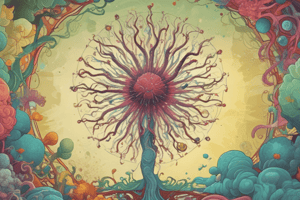Podcast
Questions and Answers
What is the first step in the mechanism of virus induced disease?
What is the first step in the mechanism of virus induced disease?
- Entering the cells and replication
- Attachment to the cell surface (correct)
- Viral release by budding
- Replication of viruses inside cells
How do viruses cause tissue damage after entering the cells?
How do viruses cause tissue damage after entering the cells?
- Recognition of viral protein by the immune system
- Promotion of cell fusion
- Inhibition of host cell DNA or RNA and protein synthesis
- Host cell lysis (correct)
Which phase involves the multiplication of virus and cell damage?
Which phase involves the multiplication of virus and cell damage?
- Viral release by budding
- Attachment to the cells
- Eclipse phase (correct)
- Penetration by endocytosis
Which type of viruses alter the cell metabolism and lead to necrosis?
Which type of viruses alter the cell metabolism and lead to necrosis?
Where does the RNA and protein synthesis take place during viral replication?
Where does the RNA and protein synthesis take place during viral replication?
What is the primary function of viral protein (legends) in virus induced disease?
What is the primary function of viral protein (legends) in virus induced disease?
Which process immediately follows the attachment of a virus to specific cellular surface receptors?
Which process immediately follows the attachment of a virus to specific cellular surface receptors?
How do cytotoxic viruses, such as Herpes and Parvo, contribute to tissue damage?
How do cytotoxic viruses, such as Herpes and Parvo, contribute to tissue damage?
In which phase of viral replication does the multiplication of virus and cell damage occur?
In which phase of viral replication does the multiplication of virus and cell damage occur?
What is the immediate result of viruses entering the cells during virus induced disease?
What is the immediate result of viruses entering the cells during virus induced disease?
Flashcards are hidden until you start studying
Study Notes
- Department of Pathology, Faculty of Veterinary Medicine, NewVally University, Egypt
- Dr. Abdel Fattah Ibrahim El Zanaty, MVSc., Ph.D. (Pathology), contact: 010 93131520
- Virus-induced disease mechanisms:
- Viruses attach to target cell surfaces using specific viral proteins and cellular proteins
- After attachment, viruses enter cells and replicate, causing damage to host cells
- Viruses inhibit host cell DNA, RNA, and protein synthesis
- Viruses damage cell membranes or promote cell fusion
- Replication of viruses inside cells results in host cell lysis
- Immune system recognizes viral proteins on cell surfaces and kills infected cells
- Viral replication process:
- Attachment to cells: Binding of viral protein to specific cellular surface receptors
- Penetration: Immediate entry into cells via endocytosis
- Eclipse phase:
- Multiplication of virus and cell damage
- RNA and protein synthesis take place in cytoplasm
- Viral release:
- Cytocidal viruses: Alter host cell metabolism and cause necrosis (Herpes, Picorna, Parvo, Adeno, Flavivirus)
- Non-cytocidal viruses: Replicated by budding.
Studying That Suits You
Use AI to generate personalized quizzes and flashcards to suit your learning preferences.




